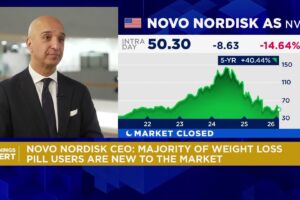
Not all savings accounts are created equal — and most Americans have the wrong ones.
Nearly 70% of Americans have savings accounts paying less than 2% interest, according to a survey of 1,000 consumers conducted by personal-finance website Bankrate. One in five consumers earns less than 1% annual percentage yield (APY) on the short-term savings, and nearly one in four people said their savings account didn’t earn interest at all.
Meanwhile, only 14% of consumers said their savings accounts earned more than 2% APY.
The national average interest rate for savings accounts is 0.09%, according to the Federal Deposit Insurance Corp. For money market accounts, the national average rate is slightly higher at 0.18%.
But finding a savings account that can earn more than 2% interest isn’t a difficult endeavor. In fact, it could be as simple as opening an online savings account.
“You can and should be earning a competitive return on your savings,” said Greg McBride, chief financial analyst at Bankrate.
Read more: Why companies from T-Mobile to SoFi want to get into banking
Bankrate surveyed 57 financial institutions to inquire about the interest rates across 60 federally-insured online savings and money market accounts.
The vast majority of these account (87%) paid at least 2% APY, with the average interest rate being 2.18%, and nearly all of them (92%) were available nationwide.
Finding a savings account that can earn more than 2% interest isn’t a difficult endeavor. In fact, it could be as simple as opening an online savings account.
Moving your money into an account that earns more interest will pay off. If you put $10,000 into a savings account that earned 2.25% APY, as some online savings accounts from institutions such as Goldman Sachs’ GS, +0.54% and Synchrony SYF, +0.17% do, you would earn $1,327 over 5 years.
Comparatively, a consumer who puts $10,000 into a savings account earning the national average rate of 0.09% would earn only $45 in interest over 5 years.
The good news: There’s not a significant barrier to entry when it comes to these accounts. More than half of these online accounts had a minimum opening deposit of $100 of less, and 35% had no minimum deposit requirements.
Also see: 4 biggest mistakes most people make with credit-card rewards
Moreover, numerous companies have begun offering new money and banking accounts designed to earn higher interest than the standard interest rate at larger banks, including wireless company T-Mobile TMUS, +1.66% robo advisor Wealthfront and student loan firm SoFi.
One reason people are missing out on higher interest rates: Bank accounts are “sticky.” Over a third of consumers told Bankrate they hadn’t opened an online account because they didn’t want to leave their current bank or because they wanted access to a local branch. One in four people said they were concerned about the security of the accounts.
However, online savings accounts can easily be linked to another account at a brick-and-mortar bank or credit union. And so long as the account is insured by the FDIC or the National Credit Union Share Insurance Fund, the money will be protected.








